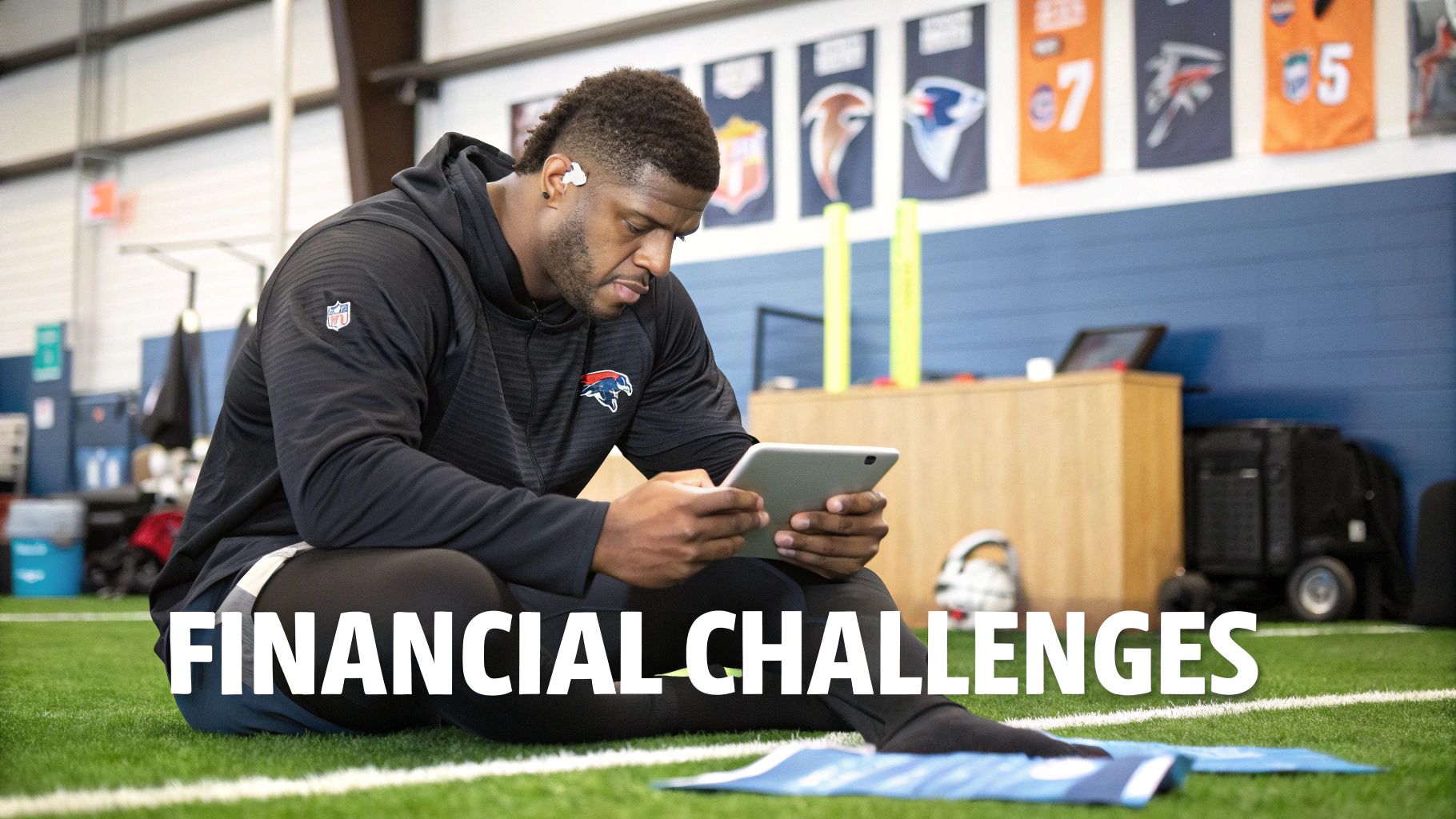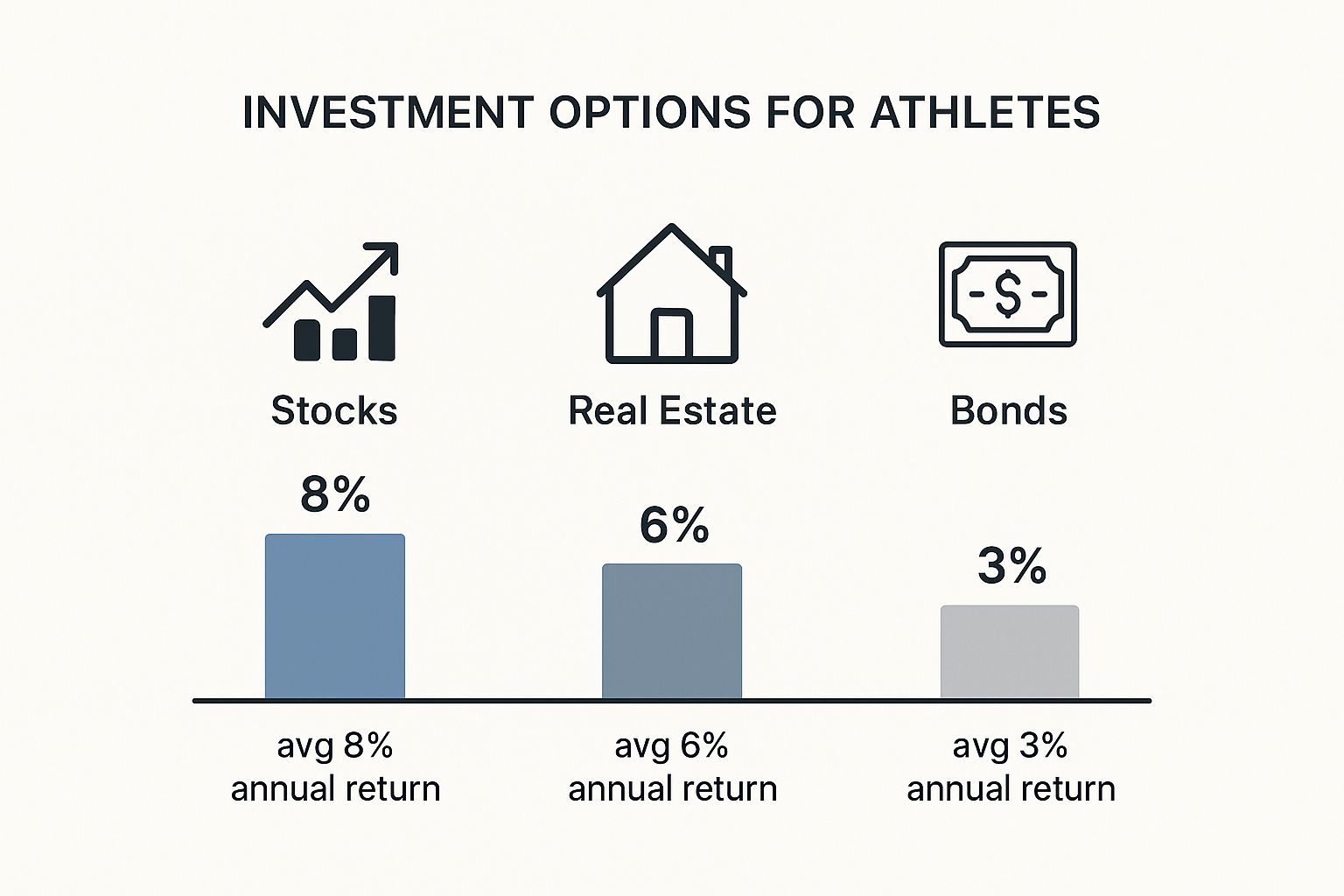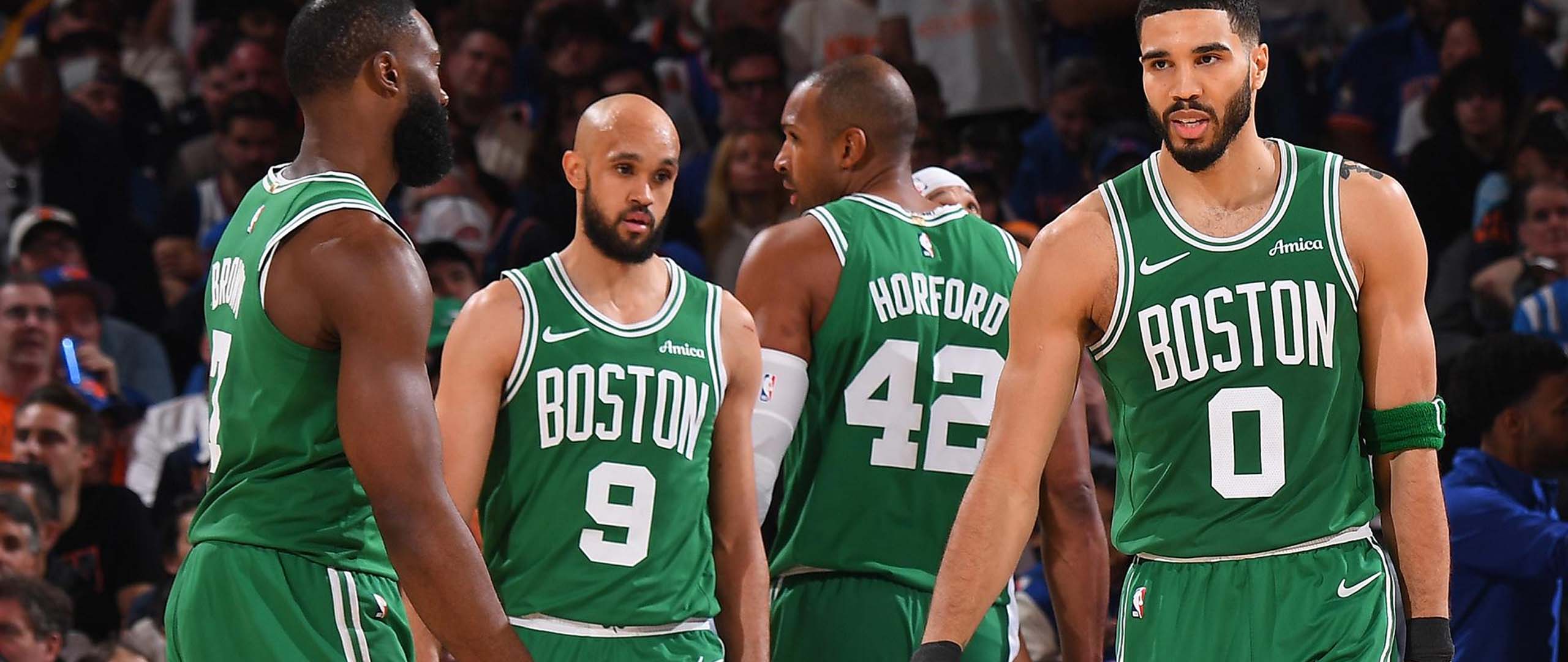A financial advisor for athletes is a specialist who builds a wealth management strategy around the unique financial rollercoaster of a professional sports career. They do far more than offer standard investment advice. They’re there to manage sudden, massive windfalls, navigate incredibly complex multi-state taxes, and map out a prosperous life long after the game is over.
Simply put, their job is to make sure your short-term earnings create long-term security.
Why Athletes Need a Specialized Financial Playbook

Making it as a professional athlete is the finish line of a lifelong dream. But it’s also the starting line for a financial journey that looks nothing like the one most people take. The typical script—work for 40 years, save a little from each paycheck, and retire in your 60s—just doesn't apply here.
Athletes are on a completely different timeline. A lifetime's worth of earnings can show up in just a handful of seasons. This sudden wealth is an incredible opportunity, but it’s also loaded with risk. Without a game plan designed for this specific reality, it’s frighteningly easy to fall into the same traps that have caught so many others.
Managing seven-figure contracts, endorsement deals, and performance bonuses demands more than a simple budget. It requires a sophisticated understanding of cash flow, tax headaches, and serious risk management.
A standard advisor might plan for a marathon, but an athlete's financial life is a sprint. The goal isn't just to finish the race; it's to build a foundation that supports you for decades after you've crossed the finish line.
The Challenge of a Condensed Career
The single most important factor shaping an athlete's financial life is just how short their peak earning years are. This isn't just a feeling; it's a cold, hard fact. The average career length is shockingly brief and varies wildly by sport.
NFL players last just 3.3 years on average. NBA players get about 4.8 years, while MLB players see around 5.6 years in the league. This compressed window means every single financial decision is amplified. There’s almost no time to recover from a bad move. You can find more details on these career stats in this financial advisor guide from smartasset.com.
This is exactly why a specialized financial advisor for athletes isn’t a luxury—it’s an absolute necessity. They get the pressure and build strategies that work within these tight constraints.
Financial Hurdles Unique to Professional Athletes
The financial challenges facing athletes are unlike those in any other profession. A generalist advisor, no matter how skilled, simply won't have the playbook for this unique environment. Here’s a look at the hurdles that make specialized guidance non-negotiable.
These aren't minor details; they are career-defining challenges. An advisor who has navigated them countless times before is an indispensable part of an athlete's core team.
Beyond Standard Financial Advice
A specialist brings a level of expertise to the table that a general advisor just can't match. Their guidance is crucial for several key reasons:
- Sudden Wealth Management: They know how to absorb large sums of money—like a signing bonus—without letting it derail the plan. They build a system that prevents overspending and immediately puts that capital to work for your future.
- Complex Tax Navigation: Athletes often pay taxes in every single state they play in, a messy situation known as the “jock tax.” A specialist doesn't just react to this; they build proactive strategies to keep the tax burden as low as legally possible.
- Lifestyle and Budgeting: They help you craft a budget that feels good today but also aggressively funds the future you want, long after the paychecks stop. It's about finding a sustainable balance.
- Risk Mitigation: From sourcing career-ending injury insurance to shutting down sketchy investment ideas from unqualified people, your advisor is your first line of defense. They act as a gatekeeper, protecting what you've built.
Ultimately, hiring an advisor who lives and breathes the sports world is like building a defensive line for your finances. They help you run up the score when the opportunity is there while protecting you from the unique blitzes that can wipe you out.
Navigating the New Frontier of NIL Deals

The world of college sports has changed, and it's not changing back. What was once a strictly amateur stage is now a wide-open marketplace where student-athletes can earn serious money long before going pro. This new reality is all thanks to Name, Image, and Likeness (NIL) deals, which let athletes cash in on their personal brand through everything from sponsorships to local appearances.
For a gifted athlete, this is a game-changer. The chance to build wealth is no longer a far-off dream—it's happening right now. But this sudden rush of income brings with it a whole new set of financial hurdles that most young adults are simply not equipped to handle. It's an exciting time, but it's also loaded with potential traps.
The shift happened almost overnight. In June 2021, a U.S. Supreme Court ruling tore down the NCAA's old rules, instantly creating a massive new industry. Since then, NIL deals have exploded, generating well over $1 billion for college athletes—a number that's still climbing fast. The decision completely reshaped the landscape, and you can get a deeper look at what it meant for the financial world by reading about the NIL game for financial advisors on advisorengine.com.
Understanding the NIL Opportunity
NIL isn't just about a few sponsored Instagram posts. It’s a full-blown business opportunity that can pop up in all sorts of ways. A financial advisor for athletes helps you make sense of these different income streams so you can manage them properly.
Here are just a few of the common ways athletes are cashing in:
- Social Media Endorsements: Getting paid to promote brands on platforms like Instagram, TikTok, and X.
- Sponsored Appearances: Being the main attraction at local businesses, charity galas, or corporate events.
- Autograph Signings: Turning your signature into a revenue stream at fan meet-and-greets.
- Youth Sports Camps: Hosting or appearing at clinics to teach your sport to the next generation.
- Merchandise Sales: Launching your own line of branded t-shirts, hats, or other gear.
Each of these is another way to get paid. But each one also comes with its own tax rules and financial complexities that need to be managed carefully.
A great NIL deal is only the first step. The real win is turning that income into a foundation for long-term financial security, which requires a deliberate and professional strategy.
The Hidden Risks of NIL Income
The appeal of a six-figure contract can easily blind a young athlete to the dangers that come with it. Without the right advice, that newfound wealth can vanish just as quickly as it appeared. The challenges are very real and require a steady, expert hand.
A specialist financial advisor for athletes knows exactly what to look for. They’re trained to spot these financial landmines and build a protective wall around your money, acting as your first line of defense against the common mistakes that can sink a promising career.
Major Financial Hurdles for Student-Athletes
Successfully managing NIL money means understanding the unique obstacles you’re up against. These aren't your typical money problems; they are specific to the world of high-earning young athletes.
- Complex Tax Burdens: This isn't a simple W-2 paycheck. NIL money is usually considered self-employment income, which puts you on the hook for tracking all your business expenses and paying quarterly estimated taxes. Get this wrong, and you could be facing a monster tax bill and stiff penalties from the IRS.
- Predatory Agreements: Not every contract slid across the table is a good one. Some are filled with awful terms, hidden clauses, or long-term restrictions that could hamstring your future earnings. A sharp advisor vets these deals to make sure they actually serve your best interests.
- Poor Investment Choices: Once you have money, everyone has a "can't-miss" investment idea for you—friends, family, and total strangers. Many of these are either incredibly risky or outright scams. An advisor brings the discipline and expertise to cut through the noise and guide you toward smart, sound investments.
- Lack of Budgeting: It’s incredibly easy to fall into a high-spending lifestyle when big checks start rolling in. Without a real budget, NIL income gets burned on things that lose value, like fancy cars and jewelry, instead of being put to work building your future.
Winning in the NIL world is a team sport. You rely on coaches to succeed on the field. You need that same level of professional guidance to manage your money off of it. That’s how you make sure the hard work you put in today builds real, lasting wealth for tomorrow.
Understanding What a Specialist Advisor Actually Does
So, beyond the buzzwords, what does a financial advisor for athletes really do, day in and day out? Their role is a world away from just picking stocks. Think of them as the CFO of your personal brand, handling a unique set of challenges that a standard advisor might never even see.
They’re part financial strategist, part defensive coordinator, and part business manager, all rolled into one. They are the person in your corner translating complex financial jargon into a clear, actionable game plan. This is what separates a story of lasting wealth from a cautionary tale.
Building a Bulletproof Budget
The foundation of any solid plan is a budget, but for an athlete, this document is entirely different. A specialist isn’t just tracking your monthly bills; they’re building a cash flow plan that can handle the extreme peaks and valleys of a pro career.
This means:
- Managing Lump-Sum Payments: They’ll strategically allocate huge signing bonuses or contract payments to avoid sudden lifestyle inflation and immediately put that capital to work toward your long-term goals.
- Planning for Off-Season Gaps: They ensure you have enough liquid cash set aside to comfortably cover months of expenses when the game checks stop coming.
- Factoring in Unpredictable Income: Your budget is structured to treat performance bonuses or endorsement deals as windfalls—welcome additions to your plan, not guaranteed income you can count on spending.
Strategic Investment Management
Once your cash flow is under control, the focus shifts to making your money grow. A specialist financial advisor for athletes builds an investment portfolio designed specifically for a condensed earning window. This isn't about chasing risky, high-return fads. It’s about building sustainable, long-term growth that will support you for life.
The goal is simple: convert the income you earn today into a diversified portfolio that generates returns for decades to come. To give you an idea, here’s a simplified look at how different investment vehicles can be balanced.

This visual shows how different asset classes can be combined to manage risk while still aiming for meaningful growth over the long haul. An advisor uses this kind of thinking to build a personalized strategy that lines up with your specific timeline and how much risk you’re comfortable taking.
Navigating Complex Tax Liabilities
This might be one of the most critical and complicated jobs an athlete's advisor has: managing taxes. Pro athletes face a notoriously difficult tax situation known as the "jock tax," which forces them to file and pay income taxes in nearly every state and city where they play a game.
A skilled advisor doesn't just help you pay these taxes; they build a proactive strategy to minimize them. This can involve structuring contracts, timing endorsement payments, and establishing legal entities to reduce the overall tax burden, potentially saving you hundreds of thousands of dollars over a career.
This specialized tax planning is a core skill that directly protects your bottom line and is a huge differentiator between a true sports specialist and a general financial planner.
Comparing Generic vs Athlete-Specialized Financial Services
This table makes it clear that while both types of advisors manage money, the strategies and skills required for an athlete are in a completely different league.
Comprehensive Risk Management
An athlete's career is fragile. One injury can change everything in an instant. A huge part of an advisor's job is building a financial safety net to protect you from the worst-case scenarios.
This involves several layers of protection:
- Disability Insurance: They find and secure high-limit disability insurance, specifically "own-occupation" policies that pay out if you can no longer play your specific sport.
- Life Insurance: They establish the right amount of life insurance to protect your family, ensuring their financial security isn't tied to your career lasting forever.
- Vetting Opportunities: They act as a critical gatekeeper, shielding you from shady business proposals and high-risk "opportunities" pitched by friends, family, or strangers. An estimated 78% of NFL players face financial trouble after retirement, often due to bad investments or scams.
This defensive game plan is every bit as important as the offense-oriented, growth part of your strategy.
Long-Term Legacy and Estate Planning
Finally, a financial advisor for athletes helps you think way beyond your playing days. Their work is focused on making sure the wealth you build today creates a lasting legacy for your family and supports whatever you want to do next.
This includes setting up trusts for your children, creating a will, and establishing a clear plan for your assets. You can learn more about how all these pieces fit into a bigger picture by exploring our approach to comprehensive financial planning. It’s all about making sure your success on the field translates into security for generations.
Ultimately, an advisor's daily work is a constant balancing act—managing the present while aggressively planning for a future that will last much, much longer than any athletic career.
How to Vet and Choose Your Financial Advisor

Picking the right financial advisor is easily one of the most important business decisions an athlete will ever make. This isn't just about hiring someone to manage your investments. It's about finding a long-term partner who will guide your financial life for decades to come.
Frankly, the right choice can be the difference between lasting wealth and becoming just another statistic.
The process demands a deliberate, methodical approach. You're hiring a CFO for your personal enterprise, so the vetting process should be just as rigorous. Rushing this or just taking a friend's recommendation without doing your own homework is a recipe for disaster.
Non-Negotiable Qualifications
Before you even think about interviewing candidates, you need to set a baseline of non-negotiable qualifications. Think of these as the absolute minimum entry requirements for anyone you'd consider trusting with your future. A true professional financial advisor for athletes will meet these standards without breaking a sweat.
First and foremost, the advisor must be a fiduciary. A fiduciary has a legal and ethical duty to act in your best interest at all times. This is a critical distinction from brokers who operate under a less strict "suitability" standard, which only requires them to recommend products that are suitable—not necessarily what's best for you.
Second, look for key professional certifications. The Certified Financial Planner™ (CFP®) designation is the gold standard in the industry. Earning it requires deep training, passing tough exams on everything from investments to estate planning, and a commitment to a strict code of ethics.
Finally, insist on a transparent, fee-only compensation structure. This means the advisor gets paid directly by you—usually a percentage of the assets they manage or a flat annual fee. This model gets rid of the conflicts of interest that pop up when advisors are paid commissions to sell you specific financial products.
Key Questions to Ask Every Potential Advisor
Once you have a shortlist of qualified candidates, the interview process begins. This is your chance to dig into their philosophy, their experience, and how they actually operate. Don't be intimidated. You are the one doing the hiring, and you have every right to ask tough questions.
Here is a checklist of critical questions to guide your conversations:
- Experience with Athletes: "How many professional athletes are you currently working with? Can you describe some of the unique financial challenges you've helped them solve?"
- Fiduciary Commitment: "Will you sign a fiduciary oath in writing, confirming you will always act in my best interest?"
- Compensation Structure: "How exactly are you paid? Can you show me a full breakdown of all fees I would be charged, including management fees and underlying investment costs?"
- Sudden Wealth Management: "What is your process for managing a large, lump-sum signing bonus or contract payment?"
- Investment Philosophy: "Describe your investment philosophy. How do you approach building a portfolio for someone with a short high-earning window?"
- Team Collaboration: "How do you work with other members of an athlete's team, such as their agent or accountant?"
You're looking for answers that are direct, clear, and specific. Vague responses or any hesitation to put their fiduciary commitment in writing are major red flags.
The goal of the interview isn't to find someone who promises the highest investment returns. It's to find a trusted partner who understands your unique world and has a clear, disciplined process for protecting and growing your wealth.
Spotting the Red Flags
Knowing what to look for is only half the battle; you also have to know what to avoid. Predators and unqualified advisors are unfortunately common in the sports world, drawn by the allure of big contracts. Always trust your gut—if something feels off, walk away.
A few clear red flags include:
- Guarantees of High Returns: No legitimate advisor can guarantee investment performance. Anyone promising "can't-miss" returns is a salesperson, not a professional.
- Pressure to Act Quickly: A true professional will encourage you to take your time and make a thoughtful decision. High-pressure sales tactics are a sure sign that something is wrong.
- Lack of Transparency: If an advisor is evasive about fees, how they get paid, or their credentials, it's a clear signal to end the conversation.
Choosing your financial advisor is a foundational step in securing your future. A skilled professional who specializes in the unique world of sports and entertainment wealth management will provide immense value. For a deeper look into this specialized field, you can learn more about our specific approach to the sports and entertainment industries. Taking the time to find the right partner is an investment that will pay dividends for the rest of your life.
Building a Wealth Strategy Beyond Your Career
The final buzzer doesn't mean the game is over; it just signals the start of your financial life. An athletic career is a phenomenal, but incredibly short, window of intense earning. The real win is turning that income into a lifetime of financial freedom, making sure your success continues long after you've hung up your cleats.
A skilled financial advisor for athletes is a master of this transition. Their entire focus is on building a bridge from your peak earning years to a sustainable and fulfilling future. This isn't just about stashing cash away—it's about architecting a life funded by the hard work you’re putting in right now.
This kind of forward-thinking is absolutely critical. For so many athletes, their identity is wrapped up in their sport. When that chapter closes, it can leave a huge void. A solid financial plan gives you the stability and resources to figure out what’s next with confidence, not fear.
From Peak Earnings to Sustainable Income
Going from a multi-million-dollar contract to a post-career life demands a major shift in both mindset and financial strategy. The goal is simple: make your wealth work for you, generating income that can support your lifestyle for good. This is where a specialist advisor really earns their keep.
They help you map out what you want your life to look like after the game, whether that means:
- Launching a business: Using your capital and personal brand to build something new from the ground up.
- Investing in real estate: Creating passive income streams through commercial or residential properties.
- Starting a foundation: Building a legacy by giving back to causes you're passionate about.
- Pursuing new passions: Having the financial security to go back to school, get into coaching, or break into a completely different industry.
Each of these paths needs its own funding strategy. A great advisor helps you run the numbers on these different scenarios, making sure the capital is ready to go when you are.
The smartest athletes see their playing career as the engine that funds the rest of their lives. A great financial plan is the blueprint that shows them exactly how to build that future.
Building a Legacy That Lasts
A truly great wealth strategy doesn't just stop with you. It's about creating a legacy that can support your family for generations to come. A financial advisor for athletes weaves long-term estate planning into every decision, ensuring your assets are protected and passed on exactly how you want.
This involves setting up legal structures like wills and trusts to safeguard your wealth for your children and other beneficiaries. It's a proactive step that gives you peace of mind, knowing your family’s future is secure no matter what.
The industry supporting these long-term goals is growing fast. The global Athlete Management Services market, which includes financial advising, was valued at around USD 3.21 billion in 2024 and is expected to grow significantly. This points to a clear trend: professionalizing every single aspect of an athlete's career and financial future. You can find more details on this growing market at futuredatastats.com.
The Advisor as a Lifelong Partner
Your relationship with your financial advisor should be one of the longest and most stable in your professional life. They are the steady hand who sees the whole picture—from your first big contract and mid-career investments to the transition into retirement and everything that comes after.
This long-term partnership ensures consistency and discipline. As your life changes—you get married, have kids, start a business—your advisor is there to adjust the plan. They are the objective voice in the room, helping you steer clear of emotional decisions and stay locked in on your ultimate goals.
It's a partnership built on trust and a shared vision for your future. While the strategies can get complex, getting started doesn't have to be. For anyone wanting to grasp the fundamentals, our guide on the 5 financial planning basics to consider now is a great place to start.
Ultimately, building a strategy beyond your career is about empowerment. It’s about taking control of your financial destiny and making sure the success you earn on the field becomes the foundation for a lifetime of security and opportunity.
A Few Common Questions About Financial Planning for Athletes
Even with a detailed playbook, navigating the high-stakes world of professional sports finance brings up plenty of questions. It's only natural. The journey to building real, lasting wealth is filled with unique forks in the road and decisions that feel massive.
Below, we've answered some of the questions we hear most often from athletes and their families. Think of this as a straightforward guide to help reinforce the strategies you need to build a secure future long after your playing career is over.
When Is the Right Time to Hire a Financial Advisor?
Honestly? The moment you start earning significant income. That could mean signing your first professional contract or landing a major NIL deal that completely changes your financial reality overnight.
Getting started early is a huge advantage. It lets your advisor put tax-smart strategies in place from day one and helps you build solid financial habits before any bad spending patterns have a chance to take hold.
Don't wait until you're drowning in the details or feeling overwhelmed by the money. Being proactive allows an advisor to build a strong financial foundation from the very beginning, helping you sidestep the common mistakes that trip up so many young athletes dealing with sudden wealth.
What’s the Difference Between a Financial Advisor and an Agent?
This is a critical distinction, and one every athlete needs to understand cold. They are both essential members of your team, but their jobs are completely different and should never be blurred.
- Your Agent's Role: Your agent is your dealmaker. Their entire focus is on negotiating contracts, sourcing endorsements, and maximizing your earning potential. Simply put, they help you make the money.
- Your Advisor's Role: Your financial advisor’s job is to manage the money you've already earned. They handle everything from budgeting and investing to tax planning and retirement strategies. Their goal is to grow and protect your wealth for the long haul.
Think of it like this: your agent is the offensive coordinator, drawing up the plays to get you in the end zone. Your financial advisor is the defensive coordinator, protecting your lead and making sure you win the game long-term. They have to work in sync, but they have very different responsibilities.
What Are the Biggest Financial Mistakes Athletes Make?
The stories of athletes losing it all are unfortunately common, but the mistakes are usually predictable—and completely avoidable with the right guidance. One of the biggest culprits is overspending on a lavish lifestyle without a realistic budget, essentially treating a temporary, high income as if it will last forever.
Another major pitfall is chasing high-risk investments based on tips from friends or family instead of sound professional analysis. These "can't-miss" opportunities often lead to massive losses because they're either poorly vetted or, in some cases, outright scams. It's no wonder an estimated 78% of NFL players run into financial trouble after retirement, often due to these exact issues.
Finally, a huge mistake is failing to plan for taxes. The multi-state "jock taxes" are particularly complex and can lead to a staggering, unexpected bill if you're not prepared. A specialized financial advisor for athletes helps you steer clear of these traps by building a disciplined financial plan that balances your current lifestyle with your future security.
How Do Financial Advisors for Athletes Get Paid?
Understanding how an advisor is compensated is non-negotiable, as it tells you everything about their incentives and the advice you'll receive. There are three main models:
- Commission-Based: The advisor earns money by selling you specific financial products, like certain mutual funds or insurance policies. This model is ripe with conflicts of interest.
- Fee-Based: A hybrid approach where the advisor charges a fee for service but also earns commissions on products they sell. The potential for conflicts of interest remains.
- Fee-Only: This is the gold standard for athletes. The advisor is paid directly by you, usually as a percentage of the assets they manage (e.g., 1% annually) or through a flat retainer.
The fee-only structure makes the advisor a true fiduciary, which is a legal requirement for them to act solely in your best interest. It removes any incentive to push a product, ensuring their advice is objective and completely aligned with your goals.
At Commons Capital, we specialize in building robust, long-term financial strategies for high-net-worth individuals, including those in the demanding sports and entertainment industries. We operate as fiduciaries, committed to providing objective guidance that turns today’s success into a lifetime of financial security. If you’re ready to build a financial plan as elite as your performance, explore our wealth management services.





